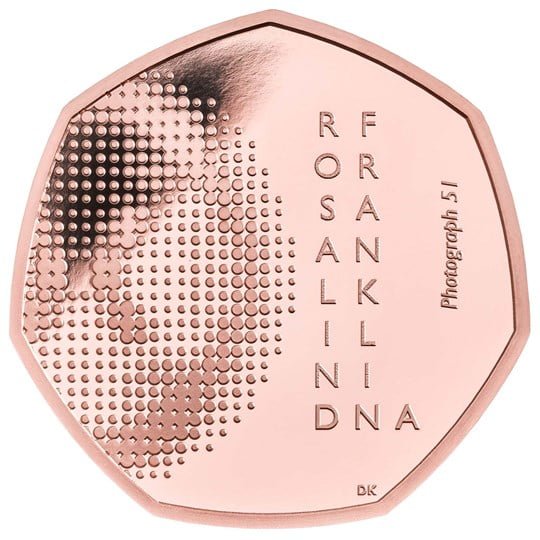Rosalind Franklin 50p – The Story of the DNA Double Helix
In 1953, Rosalind Franklin was awarded the Nobel Prize for her work on X-ray diffraction. She discovered the double helix structure of DNA, but died before she could tell anyone about it.
Rosalind Franklin was an English biophysicist who worked at King’s College London in the 1950s. Her research helped scientists understand how DNA works and led to the discovery of the double helix shape of DNA.
This 50p coin celebrates her life and achievements.
It’s been 50 years since Rosalind Franklin won the Nobel Prize for her groundbreaking work on DNA. To mark the occasion, the Royal Mint has produced a commemorative fifty pence coin featuring her work.
2021 Rosalind Franklin coin
The Rosalind Franklin coin is the second fifty pence coin released by The Royal Mint in the Innovation in Science coin collection.
Coins listed on eBay
 |
|---|
What’s it worth?
- £6 Bunc Royal Mint Pack Unopened
- £40 Silver Proof
- £60 Piedfort Silver Proof
- No gold-proof coin sales on record
What’s it look like?
This coin commemorates the 100th Anniversary of the Birth of Rosalind Franklin, best known today for her research into DNA. This is the second coin in the series, following the Stephen Hawking 50p coin released in 2019. See also Alan Turing, Charles Babbage, and John Logie Baird’s 50p coins.
How many coins were issued?
- None were put into general circulation
- 4,195 silver coins
- 1,500 piedfort silver coins
- 250 gold coins
Brilliant Uncirculated Coin
- The first time Rosalind Franklin and her achievements have been celebrated on a UK coin
- Celebrate the legacy of one of Britain’s greatest scientists
- Build your Innovation in Science coin collection
- Produced in collaboration with King’s College London where Franklin’s DNA research took place
- Housed in educational packaging that brings Rosalind Franklin’s story to life
- Product code: UK20RFBU
- Not intended for circulation
| Denomination | 50p |
|---|---|
| Alloy | Cupro-nickel |
| Weight | 8.00 g |
| Diameter | 27.30mm |
| Reverse Designer | David Knapton |
| Obverse Designer | Jody Clark |
| Quality | Brilliant Uncirculated |
| Year | 2020 |
Silver Proof Coins

silver proof coin
- Limited Edition 3,500 coins
- The first time Rosalind Franklin and her achievements have been celebrated on a UK coin
- Celebrate the legacy of one of Britain’s greatest scientists
- Build your Innovation in Science coin collection
- Produced in collaboration with King’s College London where Franklin’s DNA research took place
| Denomination | 50p |
|---|---|
| Maximum Coin Mintage | 4,195 coins |
| Alloy | .925 Sterling Silver |
| Weight | 8.00 g |
| Diameter | 27.30mm |
| Reverse Designer | David Knapton |
| Obverse Designer | Jody Clark |
| Year | 2020 |
Piedfort Coins

- A Limited Edition Presentation of just 1,500 coins
- The first time Rosalind Franklin and her achievements have been celebrated on a UK coin
- Celebrate the legacy of one of Britain’s greatest scientists
- Produced in collaboration with King’s College London where Franklin’s DNA research took place
- Offered as a prestigious double-weight Piedfort edition
| Denomination | 50p |
|---|---|
| Maximum Coin Mintage | 1,500 coins |
| Alloy | .925 Sterling Silver |
| Weight | 16.00 g |
| Diameter | 27.30mm |
| Reverse Designer | David Knapton |
| Obverse Designer | Jody Clark |
| Quality | Proof |
| Year | 2020 |
Gold Coins


- A Limited Edition Presentation of just 250 coins
- The first time Rosalind Franklin and her achievements have been celebrated on a UK coin
- Celebrate the legacy of one of Britain’s greatest scientists
- Presented in a beautiful box complete with a fascinating booklet bringing Franklin’s story to life
- Produced in collaboration with King’s College London where Franklin’s DNA research took place
- Product code: UK20RFGP
| Denomination | 50p |
|---|---|
| Maximum Coin Mintage | 250 coins |
| Alloy | 22 Carat Gold |
| Weight | 15.50 g |
| Diameter | 27.30mm |
| Reverse Designer | Dave Knapton |
| Obverse Designer | Jody Clark |
| Quality | Proof |
| Year | 2020 |
Design of the Coins
According to detail published by The Gazette, the obverse will have the usual effigy of HM The Queen with the inscription “· ELIZABETH II · D · G · REG · F · D · 50 PENCE · 2020” and for the reverse a depiction of photograph 51 accompanied by the inscription “ROSALIND FRANKLIN DNA” and “PHOTOGRAPH 51”. The coins shall have a plain edge.
What did Rosalind Franklin discover about DNA?
Franklin is best known for her work on the X-ray diffraction images of DNA, particularly Photo 51, while at King’s College London, which led to the discovery of the DNA double helix for which James Watson, Francis Crick, and Maurice Wilkins shared the Nobel Prize in Physiology or Medicine in 1962.
Why was Rosalind Franklin not awarded the Nobel Prize?
Her data was critical to Crick and Watson’s work. Sadly, Franklin would not have been eligible for the prize as she passed away four years before Watson, Crick, and Wilkins received the prize, and the Nobel is never awarded posthumously.




